Current cinema. Films reviewed: Babysitter, A Thousand and One, Dungeons & Dragons: Honor Among Thieves
Hi, this is Daniel Garber at the Movies for culturalmining.com and CIUT 89.5 FM.
This week, I’m looking at three new movies, a drama, an adventure-comedy and a sex-comedy. There’s a gang of thieves in the Middle Ages, a middle-aged couple in Québec with a seductive nanny, and a mom in Harlem with an undocumented son.
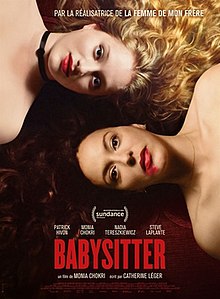 Babysitter
Babysitter
Wri/Dir: Monia Chokri
Cédric (Patrick Hivon) is a middle-class guy in a Montreal suburb, with an obsession with women’s breasts. He’s happily married with a newborn daughter but his sex life has completely dried up. Maybe that’s why, in a drunken stupor at a UFC fight, he throws himself at a sportscaster on live TV and kisses her. His immortal words Je t’aime Chantal! went viral, and made Cédric famous, but not in a good way. Now he’s on extended leave as the company investigates his sexual harassment. But with a colicky baby, neither he nor his wife on maternity leave Nadine (Monia Chokri) are getting any sleep: the baby never stops crying. So they hire a nanny named Amy (Nadia Tereszkiewicz) to take over some of the pressures of parenthood. And she has a magic touch with the baby, calming her down in an instant.
Amy is 22 years old with beautiful blonde hair and scarlet lips. She is  both innocent and seductive. And soon enough she has Nadine and Cédric under her thumb, with Jean-Michel, Cedric’s brother (Steve Laplante) close behind. But when she shows up the next day in a semi-pornographic “French maid” costume — compete with short skirt, white stockings and high heels — the three of them don’t whether to faint or explode. Will Amy save their marriage by releasing tension, or has she gone too far? Will Cédric ever learn from his misogynistic behaviour? Will Jean-Michel ever get a hold of himself? And why does Amy act like she does?
both innocent and seductive. And soon enough she has Nadine and Cédric under her thumb, with Jean-Michel, Cedric’s brother (Steve Laplante) close behind. But when she shows up the next day in a semi-pornographic “French maid” costume — compete with short skirt, white stockings and high heels — the three of them don’t whether to faint or explode. Will Amy save their marriage by releasing tension, or has she gone too far? Will Cédric ever learn from his misogynistic behaviour? Will Jean-Michel ever get a hold of himself? And why does Amy act like she does?
Babysitter is a funny and campy Québecois sex comedy. It’s done in the classic manner of French and Italian movies from the 60s where the arrival of an unexpected visitor disrupts a whole family, but updated for the “#MeToo” generation. It’s highly stylized done in a retro manner,  with bright red colours popping up in every frame, from lipstick to poppies in the garden. And the main characters’ sexual fantasies are played out in soft focus in their heads, like David Hamilton’s softcore porn of the 1970s. There’s even a gratuitous scene with a group of teenaged girls in hot pants and roller skates gliding down a suburban street, a new generation thumbing its collective nose at uptight middle age. And while the movie seems to be shown through the male gaze, filmmaker Monia Chokri adds a satirical feminist subtext, keeping it entirely tongue in cheek.
with bright red colours popping up in every frame, from lipstick to poppies in the garden. And the main characters’ sexual fantasies are played out in soft focus in their heads, like David Hamilton’s softcore porn of the 1970s. There’s even a gratuitous scene with a group of teenaged girls in hot pants and roller skates gliding down a suburban street, a new generation thumbing its collective nose at uptight middle age. And while the movie seems to be shown through the male gaze, filmmaker Monia Chokri adds a satirical feminist subtext, keeping it entirely tongue in cheek.
 A Thousand and One
A Thousand and One
Wri/Dir: A.V. Rockwell
It’s New York City in the early 1990s. Inez (Teyana Taylor) is a young hairdresser, just released from Riker’s. But when she goes back to her old neighbourhood, no one wants to talk to her and she can’t get her old job back. Worst of all, she is heartbroken to see her six-year-old son Terry maltreated by his foster parents. So one day she simply takes him away with her. And after a few weeks of couch surfing, they find a home in an old Harlem tenement, apartment number 1001. To keep them both safe from the law, she gets Terry a new social security number and a new name. He’s shy and rarely speaks but proves to be an excellent student, so much so his teacher helps him transfer to a highly competitive tech school for bright kids. Inez, meanwhile, gets back together with her boyfriend Lucky (William Catlett). Though he makes it clear he is not Terry’s father, eventually they marry and form a loving family. But life is not easy. They have to deal with an unscrupulous landlord, suspicious teachers and  aggressive cops. And always hanging over their heads is the fact they’re living under fake names and could be caught at any minute.
aggressive cops. And always hanging over their heads is the fact they’re living under fake names and could be caught at any minute.
A Thousand and One is a powerful, realistic and moving drama about the life of a family in Harlem in the 1990s and early 2000s. It’s both heartbreaking and inspiring. It traces their lives through changes of government, from Giuliani’s “Broken Windows” policy through Bloomberg’s “Stop and Frisk”, and how it affects Terry as a young Black man. It’s also a coming of age story, with three actors playing Terry at 6, 13 and 17 — Aaron Kingsley Adetola, Aven Courtney, and Josiah Cross — as he struggles through his best friend, his first crush, and his fractious relationship with his mother as they face the world. I love the period costumes, hair, locations and music. And Teyana Taylor is just amazing as Inez.
A Thousand and One is not a light movie, but it’s a good one.
 Dungeons & Dragons: Honor Among Thieves
Dungeons & Dragons: Honor Among Thieves
Co-Wri/Dir: John Francis Daley, Jonathan Goldstein
It’s sometime, somewhere far away in a mythical, mystical, medieval kingdom. Edgin and Holga (Chris Pine, Michelle Rodriguez) are former thieves locked up in a remote panopticon prison. They were caught trying to steal a magic totem but were double crossed by one of their gang. But they manage to escape. Now they want to form a new gang to pull off the ultimate heist: a charm that can bring Edgin’s wife back to life and restore his family including his daughter, Kira. Edgin is the brains, while Holga is the brawn, but they need more. They enlist Simon (Justice Smith) an insecure sorcerer with questionable powers (he earns his living picking pockets at a carnival side show.) Doric (Sophia Lilis) is a ginger-haired druid who can change, in a flash, into any animal she wants, from tiny worm to giant monster. And Xenk  (played by Bridgerton heartthrob Regé-Jean Page) — an honest and noble member of an evil clan — agrees to join the heist but only if its for good reasons, not for profit.
(played by Bridgerton heartthrob Regé-Jean Page) — an honest and noble member of an evil clan — agrees to join the heist but only if its for good reasons, not for profit.
But they must face their former ally Forge a con man (Hugh Grant). Up to now, he has taken care of Edgin’s little girl, but has since crowned himself King in alliance with a nefarious, all-powerful sorceress. To find his daughter, liberate the riches, and defeat the sorceress, the gang must first accomplish a series of nearly-impossible tasks, worthy of Theseus. Can this ragtag gang of miscreants pull it together? Or are they all headed back to prison?
Dungeons and Dragons: Honor among Thieves is a surprisingly entertaining adventure/comedy, based on the role-play board game of the same name. Players will delight in the more obscure references — from Gelatinous Cubes to Owlbears — but ordinary audiences can fully enjoy it without any background. It also incorporates the story-telling  aspects of the game, giving the whole film a rich, mythical feel. I went into this movie expecting nothing — previous Dungeons & Dragons incarnations have been dreadful. I shouldn’t have worried about this nerd paradise, seeing its co-written and directed by none other than John Francis Daley, from the TV cult classic Freaks and Geeks (he was a geek, of course). If you like Game of Thrones or Lord of the Rings, but with more laughs and less excessive gore and ponderous speeches, then you’ll love this one.
aspects of the game, giving the whole film a rich, mythical feel. I went into this movie expecting nothing — previous Dungeons & Dragons incarnations have been dreadful. I shouldn’t have worried about this nerd paradise, seeing its co-written and directed by none other than John Francis Daley, from the TV cult classic Freaks and Geeks (he was a geek, of course). If you like Game of Thrones or Lord of the Rings, but with more laughs and less excessive gore and ponderous speeches, then you’ll love this one.
Dungeons & Dragons: Honour among Thieves and A Thousand and One both open this weekend; check your local listings. Babysitter is playing at the Canadian Film Fest, on now.
This is Daniel Garber at the Movies, each Saturday morning, on CIUT 89.5 FM and on my website, culturalmining.com.
Canadians coming of age. Films reviewed: Riceboy Sleeps, Golden Delicious, Brother
Hi, this is Daniel Garber at the Movies for culturalmining.com and CIUT 89.5 FM.
Spring Film Festival season is revving up in Toronto, with Cinefranco, Human Rights Watch, The Canadian Film Fest and Tiff’s Next Wave rounding out March into April.
This week, I’m looking at three new Canadian coming-of-age dramas about sons or grandsons of immigrants. There’s a young man in Scarborough who worships his big brother, one in Vancouver who only has eyes for his new neighbour, and another kid in Vancouver who wonders why he doesn’t have a father.
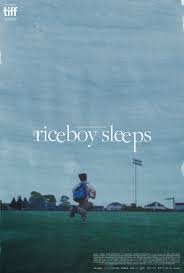 Rice Boy Sleeps
Rice Boy Sleeps
Wri/Dir: Anthony Shim
It’s the early 1990s in British Columbia. So-young (Choi Seung-yoon) is a recent immigrant from Korea who packs and seals cardboard boxes in a factory. Her son, Dong-hyun (Dohyun Noel Hwang) is shy, nervous and wears thick glasses. She taught him to read and write Korean but he’s starting public school for the first time. The other kids — all white — are merciless, say his kimbap smells like farts, and mock everything from his face to his name. His teacher calls her in to change her boy’s name to something more “Canadian” — she gives her a list of approved choices. He asks his mother, why don’t I have a father? Ask me later, she says. But the next time anyone bullies you, say you know taekwando and punch them, hard. He follows her directions and gets suspended for violence.
10 years later, he’s a teenager (Ethan Hwang) who wears contact lenses and dyes his hair blond. His teacher tells all the kids to draw a family tree, but Dong-hyun has no one to include but his mother… and she was an orphan. Again, he asks his mom who  his father was. She brushes his question off. While his mother is at work, he tries soft drugs alcohol and porn with a friend (Hunter Dillon — who also plays a best friend in Golden Delicious). But he still feels listless and unmoored. Meanwhile So-young has met a boyfriend (played by the director) and is considering marriage, until some shocking news makes her rethink her entire life… and Dong-hyun’s, too
his father was. She brushes his question off. While his mother is at work, he tries soft drugs alcohol and porn with a friend (Hunter Dillon — who also plays a best friend in Golden Delicious). But he still feels listless and unmoored. Meanwhile So-young has met a boyfriend (played by the director) and is considering marriage, until some shocking news makes her rethink her entire life… and Dong-hyun’s, too
 Riceboy Sleeps is a lovely and poetic tale of a boy and his mother trying to fit in, while grasping at whatever’s left of their history. It’s a story of immigrants living in a blatantly racist society but one that also looks at the patriarchal cruelty of the place they came from. It’s minimalist and concise, showing only what is absolutely necessary for maximal emotional impact. That — with good acting, beautiful cinematography, and scenic opening and closing shots — makes Riceboy Sleeps seem almost like a work of art.
Riceboy Sleeps is a lovely and poetic tale of a boy and his mother trying to fit in, while grasping at whatever’s left of their history. It’s a story of immigrants living in a blatantly racist society but one that also looks at the patriarchal cruelty of the place they came from. It’s minimalist and concise, showing only what is absolutely necessary for maximal emotional impact. That — with good acting, beautiful cinematography, and scenic opening and closing shots — makes Riceboy Sleeps seem almost like a work of art.
Winner of the TIFF 2022 Platform Prize.
 Golden Delicious
Golden Delicious
Dir: Jason Karman
It’s present-day Vancouver. Jake — nicknamed J-Pop (Cardi Wong) is starting his last year of high school. He likes taking photographs and watching basketball. His sister Janet (Claudia Kai) is going to culinary school, while his Mom and Dad (Leeah Wong, Ryan Mah) work 12-hour-days at their upscale Chinese restaurant, passed down from the grandparents.
Jake’s looking forward to spending time with his best buds Sam and Gary, and his childhood sweetheart Vee (Parmiss Sehat). She wants sex and lots of it, while Jake thinks they should wait till marriage before doing the big one. And he’s under lots of pressure to make the basketball team. I was MVP when I was in high school, and I’d be a pro if it weren’t for my knee injury, says dad. But everything changes when a new neighbour Aleks (Chris Carson) appears on the scene. He’s a terrific player and is outspokenly gay. He’s a ringer who moved to the school from  down east specifically to play on this team. And Jake can’t stop staring at him and snapping pics through his bedroom window. Once they meet, Aleks is willing to help improve Jake’s skills… both on and off the court. Jake is torn between family pressure and personal identity, long-term love vs short term lust. Will Jake make the team? Will Aleks make Jake? And what will his girlfriend, family, and friends do if they ever find out?
down east specifically to play on this team. And Jake can’t stop staring at him and snapping pics through his bedroom window. Once they meet, Aleks is willing to help improve Jake’s skills… both on and off the court. Jake is torn between family pressure and personal identity, long-term love vs short term lust. Will Jake make the team? Will Aleks make Jake? And what will his girlfriend, family, and friends do if they ever find out?
Golden Delicious is a coming-of-age and coming-out drama set within a Chinese-Canadian Vancouver family. It deals with current issues like bullying, the lack of privacy (due to social networks), and how parental expectations interfere with their kids’ own wants and needs. I found the high school rom-com aspects cliched, everything from two people bumping into each other and dropping their books in their first meetings, to confrontations in the locker room, to who will ask whom to the  prom. Much more interesting are the family plot turns, from Janet reverse engineering her grandmother’s recipes, to Jake’s own subtle subterfuge to get out of playing basketball, as well as the very real grinding pressures of running a restaurant (the restaurant is called Golden Delicious). That’s what makes this film worth watching.
prom. Much more interesting are the family plot turns, from Janet reverse engineering her grandmother’s recipes, to Jake’s own subtle subterfuge to get out of playing basketball, as well as the very real grinding pressures of running a restaurant (the restaurant is called Golden Delicious). That’s what makes this film worth watching.
 Brother
Brother
Wri/Dir: Clement Virgo
It’s the 1990s in a working class neighbourhood in Scarborough (Toronto). Michael (Lamar Johnson) is a high school student who lives in an apartment tower with his hard-working mother (Marsha Stephanie Blake). He idolizes his big-brother Frances (Aaron Pierre) who serves as a father figure in his life. Frances is bigger, tougher and better connected than Michael. The gangs know enough to stay away from him, and not to harass Michael, either. Michael hopes he can tap some of Frances’s aura to meet a girl who he really likes. Aisha (Kiana Madeira) is the smartest girl in school and he wants to really meet her. Michael and his friends hope to take hiphop to a new level. There’s a place to hang, a barber shop, where DJs — like Frances’ best bud — spins tracks after closing. But their big break, an audition with high-profile record producers  downtown, doesn’t pan out. And tensions rise when the twin forces of gangsters on one side and the police force on the other are encroaching on their safe space and tearing their lives apart. Can the sons of Jamaican immigrants survive in the mean streets of Scarborough?
downtown, doesn’t pan out. And tensions rise when the twin forces of gangsters on one side and the police force on the other are encroaching on their safe space and tearing their lives apart. Can the sons of Jamaican immigrants survive in the mean streets of Scarborough?
Brother is a fully-imagined, coming-of-age story by two brothers in the 90s. It deals with masculinity, violence sexuality, and black identity. It deftly contrasts between the claustrophobic highrise housing where they live and the nearby idyllic Rouge  River where they seek refuge. Based on the book by Toronto writer David Chariandy, Brother has a novelistic feel to it, and its use of widescreen cinematic scenes, as in a showdown in the courtyard outside their apartment, gives it an epic sweep. Brother is a powerful and moving drama.
River where they seek refuge. Based on the book by Toronto writer David Chariandy, Brother has a novelistic feel to it, and its use of widescreen cinematic scenes, as in a showdown in the courtyard outside their apartment, gives it an epic sweep. Brother is a powerful and moving drama.
Nominated for 12 Canadian Screen Awards, including Best Picture.
Brother and Riceboy Sleeps open in Toronto this weekend, and at the TIFF Bell Lightbox this and next week; check you local listings. Golden Delicious is premiering at the Canadian Film Festival, which runs from March 28th through April 1. Go to canfilmfest.ca for details.
This is Daniel Garber at the Movies, each Saturday morning, on CIUT 89.5 FM and on my website, culturalmining.com
Earnest movies. Films reviewed: Champions, Blueback, Nico
Hi, this is Daniel Garber at the Movies for culturalmining.com and CIUT 89.5 FM.
Some movies are just for entertainment, while others have a message. This week, I’m looking at three new movies with an earnest theme, from the US, Australia and Germany. There’s a marine biologist who wants to save a coral reef, a basketball coach who wants to bring a team of disabled people to the championships, and a geriatric nurse who wants to learn how to defend herself… after a racist attack.
 Champions
Champions
Wri/Dir: Bobby Farelly
Marcus (Woody Harrelson) is a professional basketball coach who has fallen on hard times. Now he’s an assistant coach for a third tier team in Iowa. He’s an arrogant know-it-all who doesn’t know when to shut up. He hooks up with women he meets online but they rarely stay the night. Things go from bad to worse when he’s fired from his team for losing his temper during a game. And then he gets in a car accident for driving while intoxicated.
But the judge shows some sympathy, and sentences him to community service… as a basketball coach. What’s the catch? Everyone on the team has a developmental or intellectual handicap. And they’re hoping to make it to Winnipeg for the regional championships. Problem is, they have no coach and team spirit is near zero. Marcus is equally clueless as to how to coach disabled people.
But gradually they start to get better, and bring back some of their star players. And when they need a bus to take the to away games, a  woman named Alex (Kaitlin Olson), a Shakespearean actor, volunteers to take them in her costume van. The problem is she’s also one of Marcus’s past one night stands (the danger of living in a small city). They make up and start to get along, even as the team pulls together. But can they make it to Winnipeg? Will Marcus return to his selfish ways or is he a keeper? Is Alex ready to commit? And what are his plans once his three month sentence is up?
woman named Alex (Kaitlin Olson), a Shakespearean actor, volunteers to take them in her costume van. The problem is she’s also one of Marcus’s past one night stands (the danger of living in a small city). They make up and start to get along, even as the team pulls together. But can they make it to Winnipeg? Will Marcus return to his selfish ways or is he a keeper? Is Alex ready to commit? And what are his plans once his three month sentence is up?
Champions is a heartfelt comedy about a down-and-out coach trying to accomplish the impossible. On the downside, it has a fairly predictable plot and Woody Harrelson and Kaitlin Olson are likeable, but seem to coast through their roles. What’s great about this movie is the rest of the cast. The actors playing them have real-life disabilities (they were mainly cast in Winnipeg) including one player who has won a medal at the Special Olympics. They are also funny, wacky and good at what they do. And the characters they play have personalities, sex lives, jobs and families, which you rarely see in films. They’re not there as figures of fun; they’re sympathetic characters who happen to be funny. Thank God the days of Forrest Gump, Gilbert Grape, Nell, and Sling Blade are long gone. Keep in mind, the director previously brought us such gems as Dumb and Dumber and Shallow Hal. So maybe Champions is Bobby Farrelly’s apology?
 Blueback
Blueback
Wri/Dir: Robert Connolly
A small fishing village in Western Asutralia. Abby (Mia Wasikowska) is a marine biologist, who spends much of her time studying samples aboard her boat. Raised by a pearl diver and an activist, Abby grew up as a part of the sea. She has felt at home underwater ever since her mother Dora (Radha Mitchell) taught her how to hold her breath and swim down to the ocean floor. (Her father drowned when she was still little.) On one of these underwater journeys, she encounters an enormous blue fish, bigger than she is. Initially frightened, she soon realizes he’s gentle and intelligent, and will eat from her hand. A western grouper (or groper as they say in Australia), can live for 70 years and rarely strays from its home. Soon they become fast friends — she spends time alone with him, just the two of them, in his hidden alcove within the coral reefs. She also begins to record what she sees, painting watercolours of the fish she encounters. And she names her special friend Blueback.
But all is not well. A rich developer is trying to buy up the land and tear down all the beachfront houses, including Abby and Dora’s. He’s also behind the dredging of the ocean floor, and allowing industrial fisheries and voracious spear hunters to kill endangered species. Is  Blueback’s life at risk? Will their idyllic home soon be razed? And what will the future hold for Dora and for Abby?
Blueback’s life at risk? Will their idyllic home soon be razed? And what will the future hold for Dora and for Abby?
Blueback is a gentle, slow-paced drama about a mother and daughter living in harmony within an aquatic ecosystem. The story is told through a series of flashbacks of Abby as a child and as a teen, living with her single mom. (Her memories come flooding back when she returns home after her elderly mother has a stroke). Dora leads many of the protests and demos in the village, chaining herself to tractors and petitioning the government save their bay. So there are two or three actors playing Dora, Abby as well as her best friend Briggs (Pedrea Jackson, Clarence Ryan). I approached this film with trepidation — oh god, do we really need another talking fish? Luckily, the fish here don’t talk, they just swim around looking pretty (or bulbous with beady eyes in the case of Blueback.) I wasn’t deeply moved by this film, but I liked Doras political protests. And the scenery — both underwater and on land — is gorgeous.
 Nico
Nico
Co-Wri/Dir: Eline Gehring
Nico (Sara Fazilat) is a Berliner who works as a home-visit nurse for the elderly. She is zaftig, with curly hair and a warm smile. She enjoys going to parties and hanging out with her best friend Rosa (Javeh Asefdjah). She laughs a lot, but don’t get on her bad side — Nico will stand up to anyone who gets in her way. Until one day she is attacked by a group of people in an underpass. They pull her hair, punch her, kick her and hurl racist taunts. She wakes up in hospital in horrible pain with a black eye and bruises and bandages all over her face and body.
Worse than that, she is scared and withdrawn, suffering from PTSD flashbacks to her trauma. To try to win back some of her confidence, Nico signs up for lessons at a karate dojo whose sensei is a former champion. Maybe learning to block a violent stranger will equip her to face any future attack. But so far she is drained of all energy. In the hope of cheering her up, Rosa takes her to the Fun Fair in the park. There they meet a carnie named Ronny (Sara Klimoska). She’s an undocumented young woman from Macedonian who speaks no German, so they use English instead. Ronnie takes them to rides and bumper cars. Nico feels a bit better, but things are still not back to  normal. Will she ever feel good again? Is Karate the answer? And why is Ronnie being so friendly to her?
normal. Will she ever feel good again? Is Karate the answer? And why is Ronnie being so friendly to her?
Nico is about a woman who loses her identity and self image when attacked by a racist gang, and her attempt to win it back again. She is an assimilated German Berliner, who in just a moment has her entire essence stripped away because of her looks. Nico and Rosa are both of Iranian background but to her attackers she is just another Muslim foreigner. Her feminism, her beliefs, her droll sense of humour, her opposition to wearing a hijab — none of that matters to the people who attack her. The film delves deep into her emotions, both internal and external, as she struggles to recover. Sara Fazilat is excellent as Niko as are the raw-but-real characters surrounding her.
Nico is a realistic film with lots of emotional oomph.
I like this one.
Champions and Blueback open this weekend in Toronto; check your local listings. Nico has its Canadian premier on March 14th, 6:30pm, at the TIFF Bell Lightbox as part of Goethe Films: I Have A Crush On You series.
This is Daniel Garber at the Movies, each Saturday morning, on CIUT 89.5 FM and on my website, culturalmining.com.
On the media. Films reviewed: A Wounded Fawn, Spoiler Alert, Empire of Light
Hi, this is Daniel Garber at the Movies for culturalmining.com and CIUT 89.5 FM.
It’s December, but not everything is about Christmas. This week I’m looking at three new movies with themes set in the arts: there’s a woman who works at a cinema but never watches movies; a serial killer who finds himself part of an ancient greek play, and a writer for TV Guide who thinks his life is like a sitcom.
Co-Wri/Dir:Travis Stevens
It’s a fine art auction in NY City, and the collectors and dealers are in fighting mode tonight. The prized item is a small bronze sculpture from ancient Greece showing the Furies seeking revenge on a prone man. Kate (Malin Barr) gets the high bid and returns home triumphant with the piece in hand. So she’s surprised to see Bruce (Josh Ruben) a rival bidder, show up at her door. His boss still covets the statue and is willing pay double. Doubling her money in 24 hours seems like a good deal. She invites him in for a glass of champagne. But before long, she is dead on  the floor in a pool of blood, and the sculpture — and Bruce — are long gone.
the floor in a pool of blood, and the sculpture — and Bruce — are long gone.
Later, Meredith, another beautiful young woman (Sarah Lind) is excited over an upcoming weekend in the country with her latest paramour. Her last boyfriend was abusive, but her new one seems nice, generous and attractive. And he’s into fine art just like Mer (she works in a museum).They set off for a fun filled adventure at his isolated cottage in the woods. She is thrilled to see the cabin is actually a finished home overlooking a dense forest, and decorated with modern art. But something is strange: she hears a woman’s voice in her ear warning her to leave. And she recognizes the Greek sculpture of the Furies on his coffee table — she authenticated it for an auction just a few weeks ago. (It’s just a copy, says Bruce) What she doesn’t know is that Bruce is a 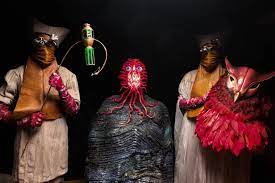 serial killer… and she might be his next victim. (Bruce is waiting for directions from a gigantic man-owl with blood red feathers who tells him who he should kill). Can Mer fight him off? And where do those strange voices come from?
serial killer… and she might be his next victim. (Bruce is waiting for directions from a gigantic man-owl with blood red feathers who tells him who he should kill). Can Mer fight him off? And where do those strange voices come from?
A Wounded Fawn is a low budget, exquisitely-crafted art-house thriller horror. What starts as a simple slasher, soon turns into a revenge pic about halfway through, where Meredith, Kate and a third victim return as the Furies to visit punishment upon Bruce. What’s really remarkable is how it incorporates greco-roman aesthetics, mythology and theatre into what could have been a simple scary horror movie, to turn it into something totally original. While it’s not always clear whether something happens for real, or just inside Bruce’s damaged brain, it doesn’t matter. A Wounded Fawn is weird and fascinating, either way.
Dir: Michael Showalter
It’s the 1990s. Michael Ausiello (Jim Parsons) is a nerdy gay guy who lives in NJ but works in Manhattan. He grew up obsessed by TV, living his life as if he were a character on an 80s sitcom. Now he’s a writer for TV Guide, where he devotes himself to work and remains perpetually single. Until he meets Kit Cowan (Ben Aldridge) at a dance club — he’s handsome, fit and popular and says Michael is just his type —a tall geek. Kit’s also in the media — he’s a professional photographer. They hit it off, but keep certain secrets to themselves. Kit lives a free-wheeling sex life — he’s not one to settle down. And Michael never came out to his small-town parents (Sally Field and Bill Irwin); he’s afraid they won’t accept him. And he’s afraid to show Kit his apartment. What is he hiding there? His Smurf collection; a veritable fuzzy blue tsunami filling every nook and cranny. But after settling their deferences, they eventually move in together. Most of the Smurfs are packed away, Michael comes out to his parents (they still love him) and they settle into domestic bliss.
Flash forward 15 years, and their relationship is on the rocks; the spark has died and they’ve grown a bit distant toward each other. But everything changes when — spoiler alert! — Kit discovers he has terminal cancer. Can they handle his 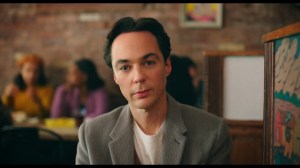 imminent death? Will their love be rekindled? And how will they spend what might be their last year together?
imminent death? Will their love be rekindled? And how will they spend what might be their last year together?
Spoiler Alert is a touching dramady about love and loss, based on a true story — Michael Ausiello’s own memoir of his life with Kit. Like the book, the movie begins with the death of Kit in Michael’s arms, hence “spoiler alert”. The director Michael Showalter, previously made The Big Sick, also about a couple and their family facing a serious illness. So is this the gay Big Sick? Not exactly — it’s a new story with a different style, like his version of Michael’s childhood as a sitcom, complete with laugh-track. And there are lots of funny parts. The bigger question is, is Jim Parsons up to playing a dramatic role, or is he forever stuck in peoples’ minds as Sheldon on the Big Bang? In this case, I think he pulls it off. He fits the role and manages to make him quirkily sympathetic. So if you’re into terminal illness comedies, here’s a good one to try on for size.
Wri/Dir: Sam Mendes
Its the winter of 1981 in a sea-side city in southern England. Hilary (Olivia Coleman) is a middle-aged woman who works at the Empire Theatre as the front of house manager. It’s an art-deco movie palace, but like the town, it’s long past its prime. Half the screens are closed and the third floor ballroom has been taken over by pigeons. Hilary is lonely and depressed, on meds, recovering from a hospital stay. Her social life consists of ballroom dancing with old men, and her sex life is furtive encounters with her sleazy, married boss (Colin Firth) in his darkened office.
But her life changes when a young man, Stephen (Michael Ward) is hired to work there. She finds him attractive, ambitious (he wants to study architecture at university)` and compassionate: he nurses a wounded pigeon back to health. He’s mom’s a nurse, from the Windrush generation, but he wants more. Hillary may be his mom’s age but there’s something there. After a few intimate moments they start a clandestine relationship. But Michael’s real ambition is to leave this town — to escape increasingly racist street violence (he’s black), and to become more than just an usher. Can their 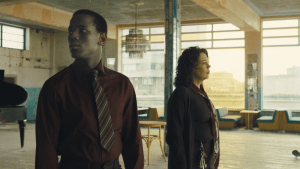 relationship last? And if they break up, can the fragile Hilary handle it?
relationship last? And if they break up, can the fragile Hilary handle it?
Empire of Light is a romantic time capsule of life in Thatcher’s England. It’s also about the joy and troubles of an intergenerational, mixed-race love affair. And it’s also about sexual harassment and anti-black racism in everyday life. And it’s also about Hillary’s mental illness, including her sudden, manic episodes. And it’s also about the rise of skinheads and the National Front, and the concurrent anti-racist ska revival. And it’s also about the collective friendship that develops among the people working at the Empire theatre. (Maybe too many ands for one movie?)
Like many of Sam Mendes films (which I generally don’t like), it’s pandering and emotionally manipulative and has a meandering storyline, that keeps you watching while it’s on, but  leaves you feeling vaguely unsatisfied afterwards. But the acting is really good, especially Olivia Coleman and Michael Ward, who rise above the movie’s many flaws. Maybe even good enough to make Empire of Light worth a watch, despite all its problems.
leaves you feeling vaguely unsatisfied afterwards. But the acting is really good, especially Olivia Coleman and Michael Ward, who rise above the movie’s many flaws. Maybe even good enough to make Empire of Light worth a watch, despite all its problems.
Empire of Light and Spoiler Alert both open this weekend in Toronto; check your local listings. And A Wounded Fawn is now streaming on Shudder.
This is Daniel Garber at the Movies, each Saturday morning, on CIUT 89.5 FM and on my website, culturalmining.com.
Daniel Garber talks with Winnie Jong, Connie Wang and Ryan Allen about Tokens
 Hi, this is Daniel Garber at the Movies for culturalmining.com and CIUT 89.5 FM.
Hi, this is Daniel Garber at the Movies for culturalmining.com and CIUT 89.5 FM.
Acting is a tough profession in Toronto, what with agents, auditions, and landing roles. But it’s even harder when all the parts out there are white… and you’re not. You end up taking stereotypical roles like “Gang Member” if you’re Black, “Taxi Driver” if you’re South Asian, or “Angry Dim Sum Customer” if you’re Chinese. Sometimes it seem like they only call you is when they have to fill a quota. But things seem to be changing, with big-budget Hollywood action movies and rom coms featuring Black and Asian casts. Is this a sea change? Or will most actors remain just tokens?
and Asian casts. Is this a sea change? Or will most actors remain just tokens?
Tokens is a satirical web series about actors of colour and what they have to go through just to get a role. Now in its second season, it brings in new controversial 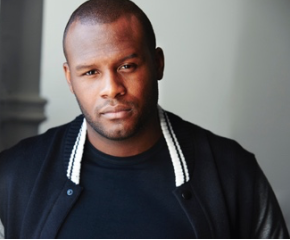 topics like white fragility, diversity quotas, and BLM protests, but dealt with in a humorous, tongue in cheek manner. With a large cast and just 8 minutes per episode, this fast-moving series keeps you guessing between laughs. The series was created by Writer/Director Winnie Jong, and stars Connie Wang as Sammie, a woman trying to make it big, and Ryan Allen as DeMar, her friend, competitor and erstwhile romantic interest.
topics like white fragility, diversity quotas, and BLM protests, but dealt with in a humorous, tongue in cheek manner. With a large cast and just 8 minutes per episode, this fast-moving series keeps you guessing between laughs. The series was created by Writer/Director Winnie Jong, and stars Connie Wang as Sammie, a woman trying to make it big, and Ryan Allen as DeMar, her friend, competitor and erstwhile romantic interest.  Winnie is an award-winning filmmaker and alumna of the Women In the Director’s Chair, and is known for TV shows like Coroner. Connie has had multiple screen nominations including the Canadian Screen Award for Best Lead Performance, and TV roles in shows like the The Boys. And Ryan is a star of stage and screen, with a leading part on Broadway in The Book of Mormon, and on TV in Titans, Star Trek and Between.
Winnie is an award-winning filmmaker and alumna of the Women In the Director’s Chair, and is known for TV shows like Coroner. Connie has had multiple screen nominations including the Canadian Screen Award for Best Lead Performance, and TV roles in shows like the The Boys. And Ryan is a star of stage and screen, with a leading part on Broadway in The Book of Mormon, and on TV in Titans, Star Trek and Between.
I spoke with Winnie, Connie and Ryan in Toronto via ZOOM.
Tokens Season 2 will be launched on iTunes on Nov 29th, 2022.
Wives and Moms. Films Reviewed: Ticket to Paradise, My Policeman, Till
Hi, this is Daniel Garber at the Movies for culturalmining.com and CIUT 89.5 FM.
With Halloween approaching, Toronto After Dark is here until Sunday night to scare your pants off. And ImagineNative continues through the weekend with in-person screenings, followed by online movies till the end of the month.
This week I’m looking at three new movies — two historical dramas and one rom-com — about wives and mothers. There’s a wedding in Bali, a love triangle in Brighton… and a lynching in Mississippi.
Co-Wri/Dir: Ol Parker
David and Georgia Cotton (George Clooney, Julia Roberts) are a power couple. He’s a celebrated architect, while she directs a famous art gallery. They met in University, married and brought up their only child Lily (Kaitlyn Dever). She’s 24 now, but her parents? They’ve been divorced for two decades. They rarely see one another, and when they do, their conversation consists of put downs, and oneupmanship. But Lily loves both her parents, and is excited when they turn up for her law school graduation. And loves the fact they both accompany her to the airport. She’s flying with her best friend Wren (Billie Lourd) for a one-in-a-lifetime  vacation at a fancy resort in Bali, before starting her job at a law firm in the fall.
vacation at a fancy resort in Bali, before starting her job at a law firm in the fall.
Once there, Lily is loving their vacation, until everything changes, when she’s stranded in the ocean far from shore. She’s rescued by a Balinese guy in a boat named Gede (Maxime Bouttier, the French/Indonesian actor/model). It’s love at first sight, and a few weeks later Lily has ditched her plans to be a lawyer and wants to live on the beach forever with a seaweed farmer. David and Georgia are invited to the wedding, and fly over together, bickering all the way. Tension rises when David discovers the jet is piloted by Georgia’s much younger boyfriend Paul (Lucas Bravo, Emily in Paris).
But the ex-couple can agree on one thing. Lily is making a terrible mistake and they must do everything they can to stop it from happening. You see, Georgia gave up a promising career  at an LA art gallery when David proposed to her — but their marriage fell apart after just a few years. So they owe it to their daughter to stop her from making the biggest mistake of her life. Will their plans succeed? Or will they alienate the only one they both love? And can David and Georgia ever get along?
at an LA art gallery when David proposed to her — but their marriage fell apart after just a few years. So they owe it to their daughter to stop her from making the biggest mistake of her life. Will their plans succeed? Or will they alienate the only one they both love? And can David and Georgia ever get along?
Ticket to Paradise is a traditional rom-com set in an “exotic” locale with big stars and some real laughs. The plot is threadbare and ridiculous — seriously, can you imagine grown- ups thinking they can stop a marriage merely by hiding the wedding rings? And it’s shot in Australia, not Bali; there’s no Kuta beach or Denpasar or Ubud, or anywhere else that evokes the island, aside from a few location shots That said, if you’re a fan of Clooney and Roberts — and they are fun to watch — and if you’re just looking for some ultra-light entertainment, and if rom-coms are your thing… well, you’ll probably like this one a lot. And even if you don’t like any of those (like me) it’s still totally watchable.
Dir: Michael Grandage (Genius: my review here)
Marion and Tom (Gina McKee, Linus Roache) are a retired couple living a quiet life in a seaside home in Brighton. But their marriage hits a rocky period when an invalid elderly boarder recovering from a stroke (Rupert Everett: The Happy Prince, review here) moves into their home. Marion feels they should take care of him, since he has no living relatives, while Tom is very disturbed by the notion. Who is he to us? He asks. What do we owe him? The answer lies in the journals he brought with him. Because, in fact, way back in the late 1950s, the three of them were very close.
Tom (Harry Styles) is a young policeman dating Marion, a schoolteacher (Emma Corrin). It’s a tender courtship and the two are deeply in love. Tom introduces her to Patrick (David Dawson) who works at the local art museum: He’s smart and sophisticated. They met at the museum when Patrick asked Tom to model for his drawings. Will Marion fall for the sophisticated Patrick over the simple, but handsome policeman? No! There is a love triangle brewing here, but Marion isn’t the fulcrum, Tom is. He’s having a secret affair with Patrick. And when Tom says he’s travelling with him to Italy to work as his personal assistant, Marion gets suspicious. Thing  is, being gay (or having gay sex) was a serious crime in the UK at the time. Somehow word gets out, and Patrick is arrested. Are Patrick and Tom in love? How about Marion? Who will vouch for Patrick if he goes to trial? Can Tom remain a policeman if his connection to Patrick gets out? And over 50 years later what will happen now that old secrets are being uncovered?
is, being gay (or having gay sex) was a serious crime in the UK at the time. Somehow word gets out, and Patrick is arrested. Are Patrick and Tom in love? How about Marion? Who will vouch for Patrick if he goes to trial? Can Tom remain a policeman if his connection to Patrick gets out? And over 50 years later what will happen now that old secrets are being uncovered?
My Policeman (based on the novel by Bethan Roberts) is a low-key, bitter-sweet drama about a menage a trois, and the fallout that comes from it. It’s told in flashforwards and flashback, following both periods simultaneously. It’s a compelling story but with a weak ending. The problem is the 50s section is much more interesting and moving, while the present day is dull and uneventful, which drags down the whole story. Harry Styles — the hugely popular pop singer — surprisingly, is not bad at all as an actor. Emma Corrin is great as the young Marion, likewise David Dawson who plays Patrick like a young Alan Cumming. I like the mood and the music and all, but as a whole My Policeman is easily forgettable.
Co-Wri/Dir: Chinonye Chukwu
It’s 1955 in Chicago.
Emmet Till (Jalyn Hall) — known as Beau to his Mom and Bobo to his friends — is 14 years old. He’s a happy, middle-class kid, who likes listening to music on the radio and playing with toys . He lives with his mom and grandparents. He’s getting ready for a train trip to visit his cousins in Mississippi, and he’s dressed in his Sunday best. But his mother, Mamie (Danielle Deadwyler) doesn’t want him to go. She warns him that Black people down there aren’t treated the same way. You have to make yourself “small”. You can’t look a white person in the eyes. Emmett does a Steppin Fetchit imitation, but Mamie says this is no joke. She comes from there, it’s a dangerous place  and she never wants to go back.
and she never wants to go back.
On the train heading south, Emmett starts to feel Jim Crow. He and all the other black passengers are forced to leave their seats and move to segregated cars. In Mississippi, all his relatives are share- croppers who pick their plantation managers’ cotton, even the kids, and spend all their money in the company store. Emmett, though, still doesn’t really get it. But when he buys some candy and whistles at the pretty white cashier, things turn from bad to worse. Three days later men bang at the door in the middle of the night and take Emmett away in a pickup truck. His lynched body, mutilated and swollen, is found floating in a river.
His mother is crushed, devastated, but, she buries her son in an open casket. It gets nationwide attention when his photos are featured in Jet magazine. And with the urging of the NAACP, she decides to return to Mississippi to seeking justice.
Till is an accurate and moving drama about this awful crime and the travesty of justice that follows. The lynching of Emmett Till served as a catalyst for the civil rights movement, but it’s also a symbol of the pervasive violence of anti-black racism. Danielle Deadwyler is stupendous as Mamie; and it’s her performance that makes this movie worth seeing. It’s told  through Mamie’s eyes: before the killing, at the funeral, in the trial that follows and its aftermath. What doesn’t work so well are the dozens of historical figures with walk-on parts. Their lines are dutifully recited but lack Deadwyler’s passionate acting; they just seem flat, and there are too many characters to keep track of. Stand-out exceptions include Darian Rolle’s powerful portrayal as Willie Reed, a surprise witness at the trial; and, of course, Jalyn Hall playing Emmett himself. Till is an important historical record that must not be forgotten.
through Mamie’s eyes: before the killing, at the funeral, in the trial that follows and its aftermath. What doesn’t work so well are the dozens of historical figures with walk-on parts. Their lines are dutifully recited but lack Deadwyler’s passionate acting; they just seem flat, and there are too many characters to keep track of. Stand-out exceptions include Darian Rolle’s powerful portrayal as Willie Reed, a surprise witness at the trial; and, of course, Jalyn Hall playing Emmett himself. Till is an important historical record that must not be forgotten.
My Policeman opens at the Tiff Bell Lightbox, with Till and Ticket to Paradise playing across North America this weekend; check your local listings.
This is Daniel Garber at the Movies, each Saturday morning, on CIUT 89.5 FM and on my website, culturalmining.com.
Daniel Garber talks with Desirée Mckenzie about the Jayu Human Rights Film Festival
 Hi, this is Daniel Garber at the Movies for culturalmining.com and CIUT 89.5 FM.
Hi, this is Daniel Garber at the Movies for culturalmining.com and CIUT 89.5 FM.
Movies are made to entertain — they should be interesting, novel, funny, exciting, or surprising. But movies can also inform, opening our eyes to important issues. Well, there’s a film festival in Toronto that does all that… and more. The JAYU Human Rights Film festival offers movies, poetry, art talks and films for  audiences to watch and to discuss afterwards.
audiences to watch and to discuss afterwards.
Desirée Mckenzie is the iAM Program Coordinator at JAYU — she’s also an award-winning poet, arts educator, and national poetry slam champion.
I spoke with Desirée in Toronto, via ZOOM.
The JAYU Human Rights Film Festival is entering its 10th year; it runs through Dec 10th.
Daniel Garber talks with Tracey Deer about Beans
 Hi, this is Daniel Garber at the Movies for culturalmining.com and CIUT 89.5 FM.
Hi, this is Daniel Garber at the Movies for culturalmining.com and CIUT 89.5 FM.
It’s the summer of 1990.
Tekehentahkhwa or “Beans” for short (Kiawentiio) is a typical,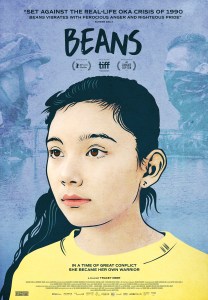 innocent 12-year-old girl who lives near Montréal with her Dad, her ambitious mom, and her little sister. Her biggest worry is getting into a posh private school to guarantee a successful future. But her life is totally changed when the town of Oka tries to grab Mohawk burial grounds to expand a golf course. Protests erupt and her family, being Mohawk, joins in. But when it turns into a blockade and a stand off involving police and the military, it reveals acts of violence and virulent racism she has never witnessed before. Now she has to make a decision: should she
innocent 12-year-old girl who lives near Montréal with her Dad, her ambitious mom, and her little sister. Her biggest worry is getting into a posh private school to guarantee a successful future. But her life is totally changed when the town of Oka tries to grab Mohawk burial grounds to expand a golf course. Protests erupt and her family, being Mohawk, joins in. But when it turns into a blockade and a stand off involving police and the military, it reveals acts of violence and virulent racism she has never witnessed before. Now she has to make a decision: should she 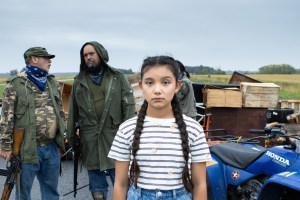 toughen up like her dad? Or keep to the straight and narrow like her mom? And how will she emerge from these life-shattering events?
toughen up like her dad? Or keep to the straight and narrow like her mom? And how will she emerge from these life-shattering events?
Beans is a fantastic new drama – told from an indigenous point of view – that combines the historical record with a highly personal and intimate coming-of-age story. Since it premiered at TIFF last fall, it has garnered dozens of awards for filmmaker, Tracey Deer who has created a work of personal and national importance.
I spoke with Tracey Deer via Zoom.
Beans is now playing in Toronto and all across Canada, from Victoria to Halifax.
Women around the world. Films reviewed: Nina Wu, White Elephant, French Exit
Hi, this is Daniel Garber at the Movies for culturalmining.com and CIUT 89.5 FM.
Spring is here and so is Toronto’s film festival season, even with all the theatres still closed. First up is the Canadian Film Fest which is on now.
This week I’m looking at three new dramas about women around the world. There’s an actress haunted by an audition in Taipei; a high school girl crushing on a white guy in Scarborough; and an insolvent socialite retiring in Paris.
Nina Wu (Wu Kexi) is an aspiring actress in Taiwan. Originally part of a rural theatre company, she moved to Taipei to make it big, but so far, six years on her big break has yet to show itself, So when her agent offers a possible role in a festival-type feature looking for an unknown actress to play a complex character in a psychological drama, she jumps at the chance. But there’s always a catch: the part calls for full frontal nudity and explicit sex. That’s not all — there’s a gruelling, and highly competitive hiring process she has to past through first. Luckily she lands the lead role. Unluckily, the director, in order to get a “real” performance out of her, treats her like hell on set and off. He works her into a frenzy, slaps her face, insults her and puts her very life in danger. She understands what an actor has to go through to deliver a spectacular performance. But that’s not all. A dark, hidden 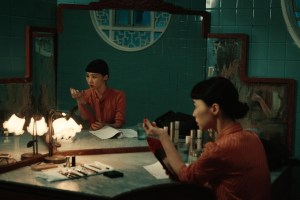 secret from the recent past, still haunts her, and is gradually pushing her to the edge. Someone is stalking her. She has disconnected memories of walking down endless narrow corridors in a red gown, passing identically dressed women at every corner. What is happening? What does it all mean? And can she survive?
secret from the recent past, still haunts her, and is gradually pushing her to the edge. Someone is stalking her. She has disconnected memories of walking down endless narrow corridors in a red gown, passing identically dressed women at every corner. What is happening? What does it all mean? And can she survive?
Nina Wu is an exquisitely beautiful mystery-thriller about the life of an actress suffering from PTSD. It’s about her, her dreams and hallucinations, as well as the movie in the movie.  So at any given moment she could be acting her role, having a nightmare, or experiencing a hallucination — and you don’t always know which one it is. Nina Wu is a collaboration between the director, Midi Z, originally from the Shan State in Myanmar, and Wu Kexi a stunning and emotionally powerful Taiwanese actress, based on her own experiences. With haunting music, striking costumes and set, beautiful cinematography and a fascinating story, Nina Wu shows the dark side of the movie industry coated with a vibrant and flashy gloss.
So at any given moment she could be acting her role, having a nightmare, or experiencing a hallucination — and you don’t always know which one it is. Nina Wu is a collaboration between the director, Midi Z, originally from the Shan State in Myanmar, and Wu Kexi a stunning and emotionally powerful Taiwanese actress, based on her own experiences. With haunting music, striking costumes and set, beautiful cinematography and a fascinating story, Nina Wu shows the dark side of the movie industry coated with a vibrant and flashy gloss.
Its the mid-nineties at a Scarborough high school. Puuja (Zaarin Bushra) is a
16-year-old Toronto-born girl who doesn’t quite fit in. She’s too Canadian for her Indian-born friends Preet and Amit (Gurleen Singh, Dulmika Kevin Hapuarachchi), too Indian for Indo-Caribbeans, and too brown for the white kids. Her main pastime is going to movies and hanging at Tim Horton’s. But when a random encounter at a theatre with a white guy she thinks is cute, things start to change. Trevor (Jesse Nasmith) doesn’t go to her school, but he’s from the neighbourhood, and hangs with his friends nearby. He seems to like her, at least as a friend. Pujaa starts lightening her hair, changing her style and wearing green-tinted contact lenses to fit in. But can a brown girl date a white guy in Scarborough? Or is their Romeo and Juliet friendship bound to fail?
White Elephant is a look at the racial division, rivalry and prejudice among kids in a multi-cultural community, as seen through the eyes of Puuja. It’s a shorter than average-film, just one hour long, but it covers a lot of ground.
There are some strange details. I’ve never heard of Canadians putting their hands on their hearts during the national anthem — that’s an Americanism. And why would Pooja’s Calcutta-born Dad scolds her for not speaking Hindi. (Wouldn’t he speak Bengali?) But these are minor quibbles. Acting was good all around, the costume design was fun, and the film gave a voice to groups rarely seen on the screen.
 French Exit
French Exit
Dir: Azazel Jacobs
(Based on the novel by Patrick DeWitt)
Frances (Michelle Pfeiffer) is a Park Avenue socialite known for her attitude. She can cut down the fiercest critic with a withering glance, and if snubbed by a waiter she’s apt to set her table on fire. She’s not one to be underestimated. When her husband died she withdrew her nondescript son Malcolm (Lucas Hedges) from prep school and brought him home. Eight years later, the coffers run dry, and she’s insolvent. So she sells her jewelry and paintings and pulls a “French exit” —an unannounced getaway — on an ocean liner with a satchel full of Euros. She’s accompanied by Malcolm and their cat. Malcolm is sad because his girlfriend Susan (Imogen Poots) refuses to follow him to Paris. (Oh to be young-ish and in love-ish again, says Frances.) They set up house in her best friend Joan’s pied à terre and start to enjoy life in Paris. And they soon have a motley crew of friends  dropping by: Madame Reynard, a lonely fan, Madeleine, a psychic, Julius, a private detective, and others. Frances is spreading the wealth, handing off wads of cash to everyone she meets. It’s almost as if she’s trying to use it all up before she says goodbye. But first she must find her runaway cat, whom she believes is a reincarnation of her late husband. Can Malcolm adjust to life in Paris? Will he ever see Susan again? What is the real reason Frances came to Paris? And what will happen when her money runs out?
dropping by: Madame Reynard, a lonely fan, Madeleine, a psychic, Julius, a private detective, and others. Frances is spreading the wealth, handing off wads of cash to everyone she meets. It’s almost as if she’s trying to use it all up before she says goodbye. But first she must find her runaway cat, whom she believes is a reincarnation of her late husband. Can Malcolm adjust to life in Paris? Will he ever see Susan again? What is the real reason Frances came to Paris? And what will happen when her money runs out?
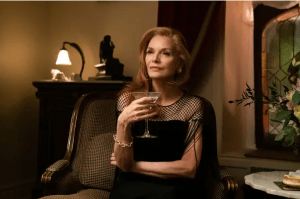 French Exit is a leisurely-paced, whimsical story, based on a novel. Lucas Hedges as Malcolm is so low key and introverted, you can barely notice him; while Michelle Pfeiffer Frances is a fantastical creation. It feels like a modern-day version of Auntie Mame. It’s written by Canadian novelist Patrick DeWitt based on his own recent book, which gives it lots of room to develop characters and supply funny lines. It may be light and inconsequential, but it’s a pleasure to watch.
French Exit is a leisurely-paced, whimsical story, based on a novel. Lucas Hedges as Malcolm is so low key and introverted, you can barely notice him; while Michelle Pfeiffer Frances is a fantastical creation. It feels like a modern-day version of Auntie Mame. It’s written by Canadian novelist Patrick DeWitt based on his own recent book, which gives it lots of room to develop characters and supply funny lines. It may be light and inconsequential, but it’s a pleasure to watch.
French Exit and Nina Wu both open today; and White Elephant is playing at the Canadian Film Festival.
This is Daniel Garber at the Movies, each Friday morning, on CIUT 89.5 FM and on my website, culturalmining.com



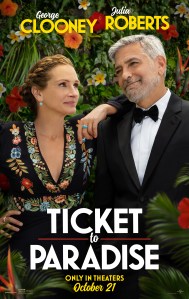
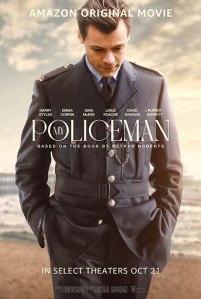
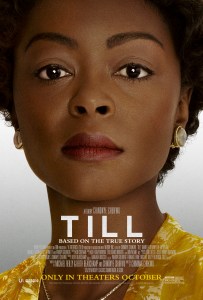

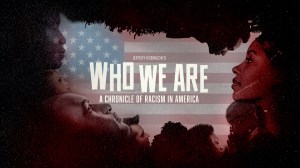

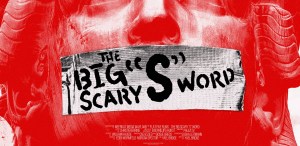


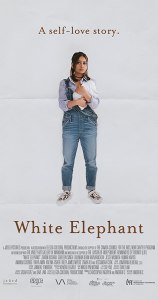
1 comment